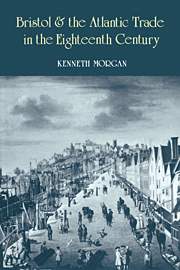Book contents
1 - Atlantic trade and the port of Bristol
Published online by Cambridge University Press: 12 October 2009
Summary
Bristol was a place of bustling commercial activity in the early eighteenth century. Merchants, shipowners, manufacturers, packers, hauliers, shipwrights, sailors and customs officers jostled one another in the centre of what was still largely a medieval walled city. Business vitality was most evident in the centre of Bristol where a spacious quay, about a mile in length, was surrounded by wooden ships, merchants' counting houses, shops and warehouses, sugar refineries and glasshouses, taverns and coffee houses, all clustered by the rivers Avon and Frome. Commercial affairs were also conducted by merchants at the Tolzey, a covered walkway in Corn Street, and, from 1745 onwards, at the Exchange in the same street, designed by John Wood the Elder. By the 1760s, many an hour was whiled away with talk of the Atlantic trading world at the Exchange coffee house and at the American and West Indian coffee houses. Trade and shipping were regularly discussed by the Bristol Corporation, which met at the Council House in a square at the intersection of Broad, Corn, High and Wine Streets. Politics and commerce were also intertwined in the lobbying activities of the Society of Merchant Venturers, founded in 1552 and based at Merchants' Hall, King Street, and in the work of Bristol's MPs. Through these influential channels, the city's trading interests were represented to Parliament and government departments. Commerce also received the close attention of local port officials – the haven master, quay wardens and water bailiffs – and of customs officers based at the Custom House in Queen Square, a group that included the Customer, Controller, Collector and Searcher, plus lesser officials such as the landwaiters and weighers.
- Type
- Chapter
- Information
- Publisher: Cambridge University PressPrint publication year: 1993
- 1
- Cited by



